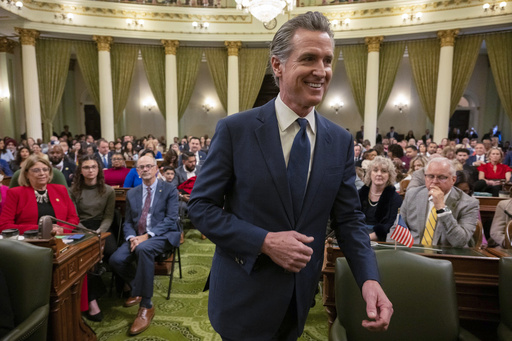
The Environmental Protection Agency (EPA) has recently approved two requests from California to impose stringent vehicle emissions standards. One of the most notable regulations includes a proposed ban on the sale of new gasoline-powered vehicles in the state by 2035. However, the incoming Trump administration is anticipated to attempt to overturn this decision.
The new regulations from California surpass the federal standards established earlier this year, which aimed to tighten emissions without mandating electric vehicle (EV) sales. The EPA determined that opponents of these waivers failed to demonstrate how California’s emissions standards conflict with the federal Clean Air Act.
Michael Regan, the EPA Administrator, stated that California has a long-standing right to seek waivers to shield its residents from hazardous air pollution generated by vehicles. He reiterated that the agency remains committed to cooperating with states to mitigate emissions and combat climate change threats.
This waiver is not only significant for California but also for more than a dozen states that adopt its leading vehicle emissions standards. Nonetheless, the waiver may have a short lifespan, as President-elect Donald Trump has expressed intentions to rescind all California waivers in favor of an increase in fossil fuel production and the repeal of key elements of a major climate law established in 2022.
In 2019, Trump revoked California’s authority over emissions, but this decision was reversed three years later when the Biden administration restored the state’s rights. Any new administration’s attempts to retract these waivers are likely to provoke additional legal disputes, which could postpone any action taken.
California’s Democratic Governor, Gavin Newsom, praised the EPA’s endorsement of the advanced clean-cars rule as a recognition of the state’s achievements in enhancing air quality and reducing pollution. He noted that Trump’s perspective tends to favor the oil industry over consumers and that California will persist in fostering innovation within the automotive sector.
Major companies such as Ford, Honda, and Volkswagen comply with California’s emission standards; however, some auto manufacturers have raised concerns about the latest EPA waiver. Many Democratic-leaning states that have adopted California’s rules, particularly those along the West Coast and in the Northeast, report that they are far from the proposed 35% EV sales target for next year and doubt they will meet the 2035 goal of an entirely electric sales portfolio.
John Bozzella, CEO of the Alliance for Automotive Innovation, emphasized that meeting the sales requirements amidst current market conditions seems nearly impossible. He suggested a need for balance and proposed that certain states should opt-out of California’s program. Although manufacturers are actively producing electric vehicles, Bozzella pointed out a significant gap between sales mandates and consumer options for vehicle types. He expects the Trump administration to withdraw the California waiver soon.
Toyota’s North American spokesman, Scott Vazin, warned that the approval of California’s waiver may skew the automotive industry, leading to a scenario where states following California’s rules will primarily receive zero-emission vehicles. He indicated that if consumers in these states are unable to afford or find an electric vehicle that suits their needs, there may be no alternative gasoline-powered vehicles available for purchase.
Environmental organizations praised the Biden administration’s action, emphasizing its importance for public health and environmental protection. Paul Cort, director of Earthjustice’s Right to Zero campaign, described the approval as a significant step in reducing pollution while also cutting consumer costs associated with fossil fuels.
Kathy Harris, from the Natural Resources Defense Council, highlighted that the decision respects California’s authority alongside other states. She affirmed that California’s initiative to transition to zero-emission vehicles is a valid approach to combatting its unique air pollution issues.
This latest action by the EPA comes amidst a Supreme Court decision to hear a business-backed challenge to a previous waiver granted by the Biden administration in 2022. The justices will be considering whether fuel producers have the legal standing to contest the waiver rather than evaluating the waiver itself. A federal appeals court had previously ruled that these companies could not sue, as they did not provide proof of being affected by the waiver, which directly pertains to vehicle manufacturers.
